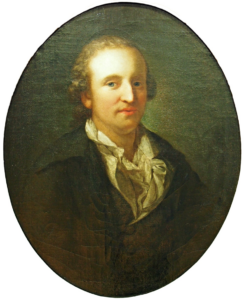Song / The grave / Mother earth
(Poet's title: Lied / Das Grab)
Set by Schubert:
D 778
[April 1823]
Des Lebens Tag ist schwer und schwül;
Des Todes Atem leicht und kühl:
Er wehet freundlich uns hinab
Wie welkes Laub ins stille Grab.
Es scheint der Mond, es fällt der Tau
Auf’s Grab wie auf die Blumenau,
Auch fällt der Freunde Trän’ hinein,
Erhellt von sanfter Hoffnung Schein.
Uns sammelt alle, Klein und Groß,
Die Muttererd’ in ihren Schoß.
O sähn wir ihr ins Angesicht,
Wir scheuten ihren Busen nicht.
Life’s day is heavy and sultry;
Death’s breath is light and cool:
It floats down to us in a friendly way,
Like a faded leaf falling into a silent grave.
The moon shines, the dew descends
Onto the grave as it does onto a flowery meadow;
The tears of friends also fall in,
Lit up by the glow of gentle hope.
All of us, great and small, are collected –
Mother Earth takes us into her lap, into her womb.
Oh, if we could look into her face
We would not avoid her breast!
All translations into English that appear on this website, unless otherwise stated, are by Malcolm Wren. You are free to use them on condition that you acknowledge Malcolm Wren as the translator and schubertsong.uk as the source. Unless otherwise stated, the comments and essays that appear after the texts and translations are by Malcolm Wren and are © Copyright.
☙
Themes and images in this text:
Breath and breathing Chest / breast Dew The earth Fields and meadows Flowers Friends Graves and burials Hope Lap, womb (Schoß) Leaves and foliage Mother Nature Night and the moon Tears and crying
der Schoß: (a) lap [der Schoßhund - lapdog; das Schoßkind - spoilt child; Mamas Schoßkind - mummy's litttle boy / girl], in Abrahams Schoß - in the bosom of Abraham; (b) (literary) womb, vagina im Schoße der Familie / Kirche - in the bosom of one's family / of the church, im Schoße der Erde - in the bowels of the earth Collins German Dictionary 2nd edition 1991
Earth is here a mother (‘die Erde’ is a feminine noun in German) who both nourishes us as we sit on her lap and suckle at her breast and gathers us all up (great and small) when we die. She takes us back into the womb from which we once emerged: our grave! There was a long tradition of pious poetry about death which presented the grave as a bed from which we will awaken into a new life, but it was much less common for poets to present the grave as a return to the womb from which we will emerge in a new birth.
☙
Original Spelling Lied Des Lebens Tag ist schwer und schwül; Des Todes Athem leicht und kühl: Er wehet freundlich uns hinab, Wie welkes Laub ins stille Grab. Es scheint der Mond, es fällt der Thau, Aufs Grab, wie auf die Blumenau; Auch fällt der Freunde Thrän' hinein, Erhellt von sanfter Hoffnung Schein. Uns sammelt alle, Klein und Groß, Die Muttererd' in ihren Schooß. O sähn wir ihr ins Angesicht; Wir scheuten ihren Busen nicht!
Confirmed by Peter Rastl with Schubert’s source, Gedichte der Brüder Ch. und F. L. Grafen zu Stolberg. Zweyter Theil. Neueste Auflage. Wien 1817. Bey B. Ph. Bauer, pages 34-35; with Musen Almanach für 1782 Herausgegeben von Voß und Goeking. Hamburg bey Carl Ernst Bohn, page 11; and with Gedichte der Brüder Christian und Friedrich Leopold Grafen zu Stolberg. Erster Theil. Wien, 1821. Im Verlage bei J.B. Wallishausser. Hamburg, bei Perthes und Besser, page 265.
To see an early edition of the text, go to page 34 [46 von 354] here: http://digital.onb.ac.at/OnbViewer/viewer.faces?doc=ABO_%2BZ160626701


